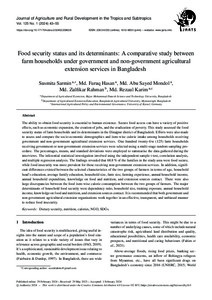| dcterms.abstract | The ability to obtain food security is essential to human existence. Secure food access can have a variety of positive effects, such as economic expansion, the creation of jobs, and the eradication of poverty. This study assessed the food security status of farm households and its determinants in the Dinajpur district of Bangladesh. Efforts were also made to assess and compare the socio-economic demographics and item-wise calorie intake among households receiving government and non-government agricultural extension services. One hundred twenty-five (125) farm households receiving government or non-government extension services were selected using a multi-stage random sampling procedure. The percentages, means, and standard deviations were employed to summarise the data gathered during the interviews. The inferential statistical investigation involved using the independent sample t-test, correlation analysis, and multiple regression analysis. The findings revealed that 68.8 percent of the families in the study area were food secure, while food insecurity was more prevalent for those receiving non-government extension services. In addition, significant differences existed between the selected characteristics of the two groups of farmers in terms of age, household head’s education, average family education, household size, farm size, farming experience, annual household income, annual household expenditure, knowledge on food and nutrition, and extension sources contact. There were also large discrepancies between the food item-wise calorie consumption between the two groups of farmers. The major determinants of household food security were dependency ratio, household size, training exposure, annual household income, knowledge on food and nutrition, and extension sources contact. It is recommended that both government and non-government agricultural extension organisations work together in an effective, transparent, and unbiased manner to reduce food insecurity. | eng |


